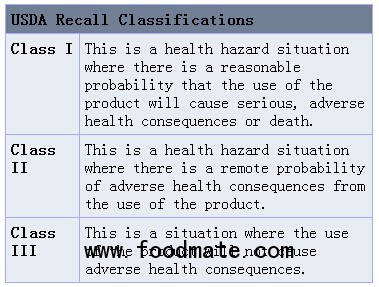The ground beef item was produced on September 2, 2015. The following product is subject to recall:
1-lb. packages containing of “SCHRADER FARMS Meat Market Ground Beef” or “SCHRADER FARMS Meat Market GROUND BEEF, BULK”
with a pack date of September 2, 2015.
The products subject to recall bear the establishment number “Est. 44950” inside the USDA mark of inspection. These products were sold at the Schrader Farms retail store in Seneca County, New York.
The problem was discovered during routine establishment testing, however this establishment failed to follow FSIS Notice 56-14 “Control of Agency Tested Products for Adulterants” and product was released in to commerce prematurely. FSIS and the company have received no reports of adverse reactions due to consumption of these products.
Many clinical laboratories do not test for non-O157 Shiga toxin-producing E. coli (STEC), such as STEC O26, O103, O45, O111, O121 or O145 because it is harder to identify than STEC O157. People can become ill from STECs 2–8 days (average of 3–4 days) after consuming the organism. Most people infected with non-STEC E. coli develop diarrhea (often bloody), and vomiting. Some illnesses last longer and can be more severe. Infection is usually diagnosed by testing of a stool sample. Vigorous rehydration and other supportive care is the usual treatment; antibiotic treatment is generally not recommended.
Most people recover within a week, but, rarely, some develop a more severe infection. Hemolytic uremic syndrome (HUS) is uncommon with STEC O26, O103, O45, O111, O121 or O145 infection. HUS can occur in people of any age but is most common in children under 5 years old, older adults and persons with weakened immune systems. It is marked by easy bruising, pallor, and decreased urine output. Persons who experience these symptoms should seek emergency medical care immediately
FSIS and the company are concerned that some product may be frozen and in consumers' freezers.
Consumers who have purchased these products are urged not to consume them. These products should be thrown away or returned to the place of purchase.
FSIS routinely conducts recall effectiveness checks to verify recalling firms notify their customers of the recall and that steps are taken to make certain that the product is no longer available to consumers. When available, the retail distribution list(s) will be posted on the FSIS website at www.fsis.usda.gov/recalls.
FSIS advises all consumers to safely prepare their raw meat products, including fresh and frozen, and only consume ground beef that has been cooked to a temperature of 160° F. The only way to confirm that ground beef is cooked to a temperature high enough to kill harmful bacteria is to use a food thermometer that measures internal temperature, http://1.usa.gov/1cDxcDQ.
Media with questions regarding the recall can contact Michelle Schrader, Marketing & Sales, at (607) 869-6328. Consumers with questions regarding the recall can contact Sue Schrader, Owner, at (607) 869-6328.
Consumers with food safety questions can "Ask Karen," the FSIS virtual representative available 24 hours a day at AskKaren.gov or via smartphone at m.askkaren.gov. The toll-free USDA Meat and Poultry Hotline 1-888-MPHotline (1-888-674-6854) is available in English and Spanish and can be reached from l0 a.m. to 4 p.m. (Eastern Time) Monday through Friday. Recorded food safety messages are available 24 hours a day. The online Electronic Consumer Complaint Monitoring System can be accessed 24 hours a day at: http://www.fsis.usda.gov/reportproblem.
Wash hands with warm, soapy water for at least 20 seconds before and after handling raw meat and poultry. Wash cutting boards, dishes and utensils with hot, soapy water. Immediately clean spills.
Keep raw meat, fish and poultry away from other food that will not be cooked. Use separate cutting boards for raw meat, poultry and egg products and cooked foods.
Color is NOT a reliable indicator that meat has been cooked to a temperature high enough to kill harmful bacteria.
The only way to be sure the meat or poultry is cooked to a high enough temperature to kill harmful bacteria is to use a thermometer to measure the internal temperature.
Fish: 145°F
Beef, pork, lamb chops/steaks/roasts: 145°F with a three minute rest time
Ground meat: 160°F
Poultry: 165°F
Hot dogs: 160°F or steaming hot
Refrigerate raw meat and poultry within two hours after purchase or one hour if temperatures exceed 90º F. Refrigerate cooked meat and poultry within two hours after cooking.






